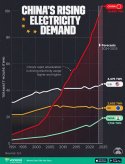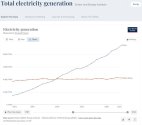I am absolutely amazed when anyone ever talks about the collapse of China. In a way, everyone who talks about this is expecting a Chinese disintegration like the Soviets, thinking that the economy will collapse like the Soviets.
These people have no idea how absurd this is. The scale of Chinese industry alone is something that the Soviets could never achieve, much less reach the kind of technological level that is comparable.
In general terms:
In PPP terms, it is already the largest economy in the world, reaching 27% larger than the US
China continues to grow at an average of 5.2% after the pandemic - more than double the US
China exports US$3.3 trillion and manages to have a surplus of US$1 trillion
Foreign exchange reserves of US$3.2 trillion
Invests more in global infrastructure - US$680 billion - than all Western powers combined
42% of its GDP is gross fixed capital formation, a higher value in % relation to GDP and in absolute nominal value compared to the US
China registers millions of patents - in 2022 they registered almost half of what the entire world registered
Investment in R&D increasing compared to the US in absolute value
The Chinese economy in the past really had three pillars:
Infrastructure
Real estate market
Export market
The return on infrastructure is increasingly lower on the economy as China gets richer and modernizes. The real estate market is now under government efforts to contain the damage caused by the bursting bubble, but it is still manageable. The export market has not only increased but has also specialized in high-tech products. In a way, China has transformed itself from a low-value-added export market to export high-value-added products, and this in less than 15 years.
Factors that can increase China's GDP:
Workforce leaving the countryside for urban areas, which adds productivity; there are still 171 million Chinese in this condition, which is the total of the US labor force, which is 168 million.
Expanding middle class representing 800 million consumers - this represents double the current Chinese middle class, which is 400 million.


